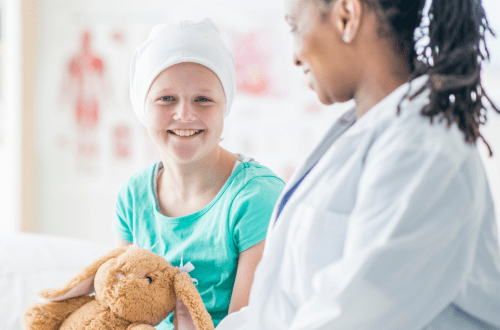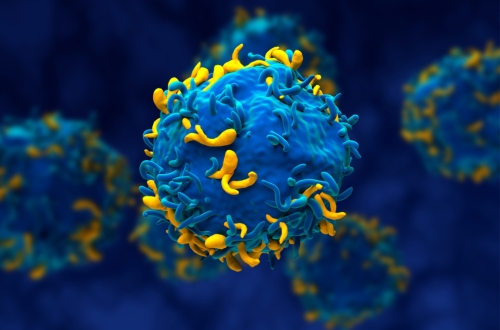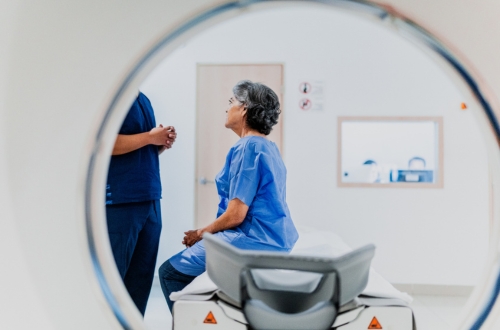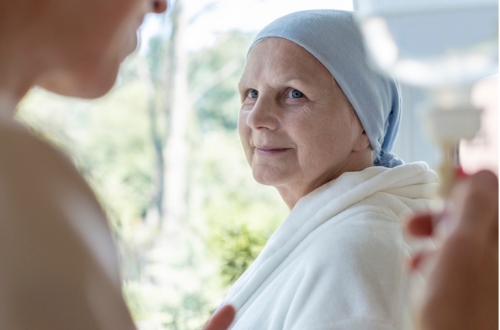Supporting Childhood Cancer Awareness: TFS Joins the St. Jude Walk/Run
September marks Childhood Cancer Awareness Month. This month is an opportunity to increase awareness, support clinical research, and inspire hope for those affected by pediatric cancer. TFS HealthScience (TFS) is proud to stand with St. Jude Children’s Research Hospital in the fight against childhood cancer. This month, we’re not only raising awareness but also actively supporting a cause that aligns with our commitment to health and research.
This article will highlight the significance of Childhood Cancer Awareness Month, discuss the importance of pediatric cancer research, and detail TFS HealthScience’s participation in the St. Jude Walk/Run event to support the cause.
What is Childhood Cancer Awareness Month?
Childhood Cancer Awareness Month, observed every September, is a nationwide campaign aimed at bringing attention to pediatric cancer. It is a time to recognize the bravery of young patients and their families, to celebrate the progress made in treatment and survival rates, and to acknowledge the work that still needs to be done. The month is symbolized by a gold ribbon, representing the preciousness of children and the strength they show in the face of illness.
This awareness month also serves as a call to action for communities, organizations, and individuals to get involved in supporting pediatric cancer research and care. From fundraising events to educational campaigns, the goal is to improve outcomes for children diagnosed with cancer and to offer support to their families during their treatment journey.
Understanding Clinical Trials in Childhood Cancer
Clinical trials are a cornerstone of pediatric cancer research. They are carefully designed studies that test new treatments, drugs, or procedures to determine their safety and effectiveness. For children with cancer, clinical trials can provide access to the latest therapies that are not yet widely available. These trials also help researchers learn more about the biology of childhood cancers and how to treat them more effectively.
Childhood cancer typically refers to cancers diagnosed in children and adolescents from birth up to 19 years of age. This range includes infants, children, and teenagers. This age range poses challenges within clinical research. Clinical trials for childhood cancer are challenging due to the rarity of pediatric cancers, ethical considerations in enrolling young patients, biological differences between children and adults, and the need to consider the long-term impacts of treatments. Additionally, limited funding and the diverse range of childhood cancers add to the complexity of conducting these trials.
Participating in a clinical trial is a personal decision for families, often made in consultation with their healthcare team. It is important to understand that clinical trials are conducted under strict ethical and safety guidelines to protect participants. Families considering this option should discuss the potential risks and benefits with their child’s doctor and explore all available treatment options.
Breakthroughs and Innovations in Pediatric Cancer Research
Below, we list some of the recent innovations, insights, and approvals in pediatric cancer therapies.
FDA approval of tovorafenib (Ojemda)
Recent advancements in clinical research have brought significant progress in the treatment and understanding of childhood cancers. One notable achievement is the FDA’s accelerated approval of tovorafenib (Ojemda) for children and teens with low-grade glioma harboring BRAF gene mutations. As of May 28, 2024, clinical trials have shown that tovorafenib can shrink or even eliminate tumors in nearly 70% of patients, offering new hope for families dealing with this challenging condition.
Long-term health of childhood cancer survivors
In addition to new treatment options, ongoing research has revealed critical insights into the long-term health of childhood cancer survivors. A study published on March 7, 2024, in Nature Medicine, found that common inherited genetic factors influencing cancer risk in the general population may also predict an increased risk of new cancers among childhood cancer survivors. This discovery could pave the way for improved screening and long-term follow-up care for these individuals, helping to manage and mitigate potential health risks.
Innovative approaches in resource-limited settings
Innovative approaches are also making a difference in resource-limited settings. An NCI-funded study highlighted the success of a simple tool designed to catch treatment-related complications in children with cancer across Latin American hospitals. This early warning system has proven highly effective and is part of a broader effort to establish sustainable healthcare solutions in these regions.
Promising new treatments: blinatumomab (Blincyto)
Among the promising new treatments, blinatumomab (Blincyto) has shown significant potential. A study reported on June 8, 2023, demonstrated that blinatumomab, when given after standard chemotherapy, substantially increased survival rates for infants with an aggressive form of acute lymphoblastic leukemia (ALL) caused by KMT2A rearrangements. If these results are confirmed in larger studies, blinatumomab could become a standard treatment for this severe condition.
Development of liquid biopsies
Researchers are also making strides in the development of liquid biopsies for children with solid cancers, such as Ewing sarcoma and Wilms tumor. These non-invasive tests are on the horizon and could revolutionize how pediatric cancers are detected, diagnosed, and monitored for treatment response and recurrence.
Protecting the heart: dexrazoxane (Zinecard)
To address the long-term side effects of cancer treatments, a study published on March 16, 2023, highlighted the benefits of dexrazoxane (Zinecard) in protecting the hearts of children treated with doxorubicin. This cardioprotective drug significantly reduces the risk of heart problems in adulthood, making it a valuable addition to pediatric cancer care protocols.
ETV6 protein as a therapeutic target
Furthermore, targeted therapy research is advancing with the identification of the ETV6 protein as a potential therapeutic target for Ewing sarcoma. This discovery could lead to the development of new, more effective treatments for this aggressive childhood cancer.
FDA approval of brentuximab vedotin (Adcetris)
In another significant development, the FDA approved brentuximab vedotin (Adcetris) on December 15, 2022, for use in combination with chemotherapy for children and adolescents with high-risk Hodgkin lymphoma. This approval followed a successful NCI-sponsored clinical trial conducted by the Children’s Oncology Group, underscoring the importance of collaborative research efforts in advancing pediatric cancer treatments.
Mitigating side effects: sodium thiosulfate (Pedmark)
To mitigate the severe side effects of chemotherapy, sodium thiosulfate (Pedmark) was approved on October 6, 2022, to reduce the risk of hearing loss caused by cisplatin, a common chemotherapy drug. This approval marks a significant step forward in improving the quality of life for children undergoing cancer treatment.
Importance of Pediatric Clinical Research in Oncology
The importance of pediatric clinical research cannot be overstated. Children with cancer have unique medical needs that require specialized research to ensure they receive the best possible care. Pediatric clinical research not only contributes to the development of new treatments but also helps improve existing therapies and supportive care practices.
Research in pediatric oncology has led to significant improvements in survival rates for many types of childhood cancer. However, the work is far from complete. Continued investment in clinical research is essential to address the challenges of treatment resistance, late effects of treatment, and the development of therapies for rare cancers.
Is Pediatric Cancer Research Underfunded?
Cancer is the leading cause of death by disease among children in the United States. For certain types of childhood cancers, such as hepatoblastoma, the incidence rates are increasing by 2 to 3% annually. Despite the severity and growing prevalence of pediatric cancers, research in this area is significantly underfunded compared to adult cancer research.
A frequently cited statistic is that only 4% of federal funding is allocated to childhood cancer research. This lack of funding is often attributed to the perception that childhood cancer is rare. However, this “rarity” doesn’t diminish the profound impact it has on young patients, who have their entire lives ahead of them.
The need for specialized research is critical. Childhood cancers are not simply smaller versions of adult cancers; they require unique treatment strategies due to differences in their biology and the developing bodies of young patients. One of the key challenges in pediatric cancer research is recruiting enough patients for clinical trials, which are essential for testing the safety and efficacy of new treatments. Due to the rarity of these cancers, it can be challenging to gather a sufficient number of participants. For example, some pediatric tumors may occur in only several thousand cases per year in the United States, while others may be as rare as 30 cases annually. This makes it crucial for researchers to collaborate nationally and internationally, sharing data and resources to move research forward.
There is a widespread desire among researchers for more funding. The advancements made in treating childhood cancers over the past few decades are nothing short of miraculous. Diseases that were once almost certain death sentences now have cure rates as high as 80-90%. This remarkable progress demonstrates that pediatric cancer research can yield significant returns on investment. However, to continue achieving such outcomes and to find cures for all types of childhood cancers, increased funding and support are essential.
The Future of Childhood Cancer Research
The advancements in childhood cancer research highlight the critical role of continued investment and collaboration in this field. From novel therapies and protective drugs to groundbreaking genetic insights, these developments offer hope for more effective treatments and better outcomes for young patients worldwide. As research continues to evolve, the focus remains on finding cures and improving the lives of children and families affected by cancer.
TFS HealthScience Joins St. Jude’s Walk/Run
In support of Childhood Cancer Awareness Month, TFS is excited to participate in the St. Jude Walk/Run event. Scheduled for September 28, 2024, this nationwide, family-friendly event brings together communities to support the lifesaving mission of St. Jude Children’s Research Hospital: Finding cures. Saving children. ®
TFS will participate in person at the Raleigh, NC (Triangle) chapter of the St. Jude’s Walk/Run on Saturday, September 21, 2024, inviting local employees to join us for a day of unity and purpose. For our remote employees, we encourage participation in their local chapters’ events or virtually through the St. Jude Walk/Run mobile app. This event offers a unique opportunity to experience the impact of St. Jude’s work through an interactive campus experience, available both in-person and virtually.
How TFS is Helping Support Childhood Cancer Awareness and Research
TFS’s involvement in the St. Jude Walk/Run exemplifies our commitment to pediatric cancer research and awareness, complementing our broader efforts in oncology and hematology clinical trials.
As a mid-size, global Contract Research Organization (CRO), TFS offers a full suite of services, from Flexible Functional Service Provision (FSP) and Strategic Resourcing Solutions (SRS) to staff your clinical trial, to study coordination and medical writing. Our Oncology Business Unit provides scientific, medical, regulatory, and operational expertise, delivering tailored solutions to ensure the successful execution of complex oncology trials.
With a highly specialized focus, TFS’s oncology and hematology team brings extreme attention to detail and a deep understanding of our clients’ unique requirements. We have supported over 300 clinical trials in oncology and hematology across all phases, with about one-third of our studies in these areas. Our hands-on experience spans a broad range of indications, including complex early-phase trials, basket trials, precision medicine, immuno-oncology, and rare hematologic diseases.
Our team of specialists are well-versed in the challenges of modern pediatric oncology and hematology trials, providing the strategy and expertise needed from trial design to completion. We are committed to offering high-quality and affordable clinical trial solutions, making cutting-edge treatments accessible to patients. By supporting innovative research, such as the work done at St. Jude Children’s Research Hospital, we contribute to the discovery of new treatments and cures, including those for childhood cancer.
We encourage our employees, partners, and community members to join us in supporting this vital cause. Participation in the St. Jude Walk/Run, donations, and spreading awareness are all impactful ways to contribute. Together, we can provide hope and support to children and families facing the challenges of pediatric cancer, advancing the fight against this devastating disease.
TFS is proud to stand with St. Jude Children’s Research Hospital and all those working towards a future where no child has to face cancer.
Get Involved! Learn more about the St. Jude Walk/Run HERE!
Connect with Us
Contact us today to discover how TFS can be your strategic CRO partner in clinical development.



